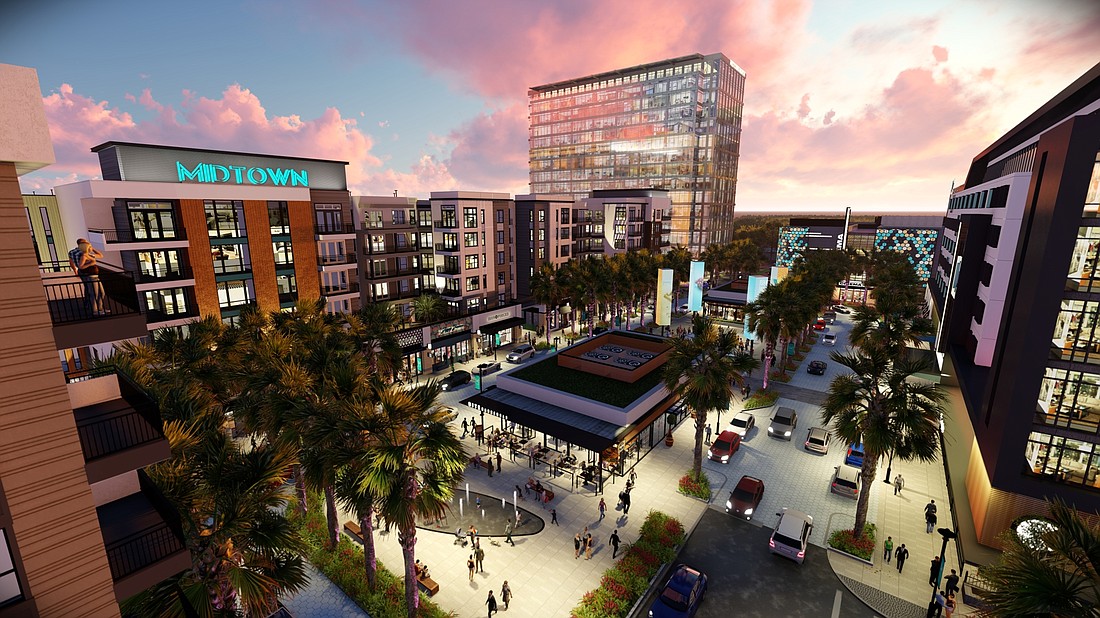With a slew of successful retail and mixed-use projects from Chicago to Sarasota and Winter Park to Raleigh, North Carolina, it’d be understandable if Casto Southeast Realty Services decided to sit back and wait to see how the retail landscape shakes out in the era of online shopping.
Instead, the Lakewood Ranch-based retail developer is busier than ever, thanks to more than a half dozen new developments planned for Tampa, Sarasota, Lakewood Ranch, Daytona, Clemson, South Carolina, Raleigh, North Carolina and Snellville, Ga., outside of Atlanta.
In a majority of the cases, Casto Southeast will either direct — or co-ordinate with other developers and partners — on a mixed-use platform that has become its hallmark in projects such as Winter Park Village, Lakeside Village in Lakeland and the Shoppes at Sarasota Row, in Sarasota.
“Mixed use is really our sweet spot,” says Brett Hutchens, Casto Southeast’s president and managing partner. “We understand it, in a way many developers don’t because they lack the experience doing it.”
Combining sectors like residential, hospitality and retail also boosts each individual sector, Hutchens says, making each individual component stronger as a result of the collective cohesion.
Casto Southeast contends, however, that regardless of the mix of uses, retail is at the center of each project.
“Retail creates the overall environment through its tenant mix, and an energy that circulates throughout,” Hutchens says. “It allows apartment developers to achieve premier rental rates and hotel operators to charge higher (average daily rates).
“That’s because people want to live, and visit, these types of places. It’s all about walkability,” he adds.
And while Hutchens acknowledges that the days of anchoring a center or a lifestyle project with high-end fashion-centric merchants and apparel-oriented stores may have diminished — the result of e-commerce and the growth of Amazon.com and others — he remains bullish on experiential-based retail development overall.
Today’s projects, for instance, are often anchored by upscale grocers, fitness and wellness tenants, restaurants, sellers of leisure activity and similar specialty merchandise and household goods purveyors, with a sprinkling of fashion-based stores.
Of all of Casto Southeast’s new projects, though, none will likely be as high profile as Midtown Tampa, a $500 million, mixed-use project that New York-based Bromley Cos. intends to construct at Interstate 275 and Dale N. Mabry Highway.
There, Casto Southeast and partner Jeffrey R. Anderson Real Estate, of Cincinnati, have signed on to develop 240,000 square feet of retail and restaurant space. The 22-acre development also is slated to contain 750,000 square feet of office space, a 400-unit apartment complex and a 225-room boutique hotel.
Bromley hopes to start Midtown early next year and complete the bulk of the 1.8 million-square-foot project by early 2021.
No tenants have been unveiled for Midtown save for a Whole Foods Market, though Hutchens says the entire mix will focus on high-end operators like the grocer that will bring new offerings to the market in Tampa.
“There’s nothing like this in the Tampa area, no open-air mixed-use development,” Hutchens says of Midtown. “It has incredible access, it’s in one of the best areas of the city and it’s regional in nature because of its adjacency to Interstate 275.”
He’s also not worried about the project’s proximity to other upscale shopping offerings. Part of the Bromley’s marketing pitch is that Midtown will better link Tampa’s downtown to the Westshore Business District.
“Midtown is in the ring of influence to International Plaza — but I think that’s a good thing,” Hutchens says.
Bromley officials declined to be interviewed for this article.
Hutchens says he first met then-Bromley CEO Bill Haines a decade ago, when the company was hoping to lure Whole Foods to the site. Casto Southeast had worked with Whole Foods, but the grocer ultimately passed as it worked to digest an acquisition.
A few months ago, Bromley — which has owned the Midtown site for more than two decades — approached Casto Southeast again with a resurrected plan to develop the property.
“They’ve been primarily an office developer in the New York area, so they were seeking people who had mixed-use or other specialized experience,” Hutchens says.
In addition to Casto Southeast, Bromley has cut a deal with Crescent Communities for apartments on the tract. Plans also call for a hotel to be developed at the site, which Hutchens believes will help both retail tenants and the as-yet unnamed hotel flag.
“We’re finding tremendous interest among hoteliers who want to be near retail projects, in part because it’s an amenity to them, an activity, and it’s also something they don’t have to worry about providing in-house.”
"Retail creates the overall environment through its tenant mix, and an energy that circulates throughout. It allows apartment developers to achieve premier rental rates and hotel operators to charge higher (average daily rates). That’s because people want to live, and visit, these types of places. It’s all about walkability." — Brett Hutchens
But while Midtown may be the most lavish project Casto Southeast embarks on over the next few years, it won’t by any means be the only one.
In Lakewood Ranch, Casto Southeast is in the early stages of a 50-acre project at University Parkway and Lakewood Ranch Boulevard that, like Midtown, will contain a mix of uses.
Center Point, as it will be known, will contain a 75,000-square-foot medical office building with an imaging and surgery center; retail space and, eventually, a hotel.
“It’s right in the middle of Lakewood Ranch,” Hutchens says. “From varying perspectives, that’s hard to beat, and it’s right in our backyard.”
In Sarasota, Casto Southeast and Bahia Vista Associates (BVA) — a partnership led by long-time investor and philanthropist Stanley Kane and Moneyshow CEO Kim Githler — intend in mid-2019 to start on a development at Bahia Vista Street and Tuttle Avenue.
There, on the site of the former Doctors Hospital, Casto Southeast and BVA are planning new medical office space and apartments. Hutchens says the 6.5-acre tract could provide much-needed workforce and more affordable housing offerings to meet demand.
“They’re very systematic in their approach to projects and they don’t try to tackle what they don’t think they can accomplish,” Githler says. “We’ve found them to be very strategic and visionary. Our deal is very small for them, in terms of capital, but they want to be involved because they’re attracted to the idea of contributing to the community. They like the challenge.”
Elsewhere in Sarasota, the company is overseeing retail leasing for The Kolter Group’s 12-story The Mark downtown.
Casto Southeast’s first tenant in the $125 million project, which is under construction and slated for completion in the latter half of 2019, is MidiCi, a Neapolitan-themed pizza restaurant and upscale bar.
In all, the project will contain about 38,000 square feet of retail space, together with 157 residences and 11,000 square feet of new office space.
Across the state, in Daytona, Casto Southeast is working on a public/private partnership with the city that could result in as many as 270 new apartments and retail space.
Casto Southeast has a trio of projects outside of Florida, as well.
In Snellville, Ga., the company is designing a mixed-use project containing retail, roughly 250 apartments and restaurants. Hutchens says work on the project, which will contain a food hall and a county library, is expected to commence in the second quarter of next year.
It also plans to augment existing projects in the Carolinas, in Clemson, South Carolina and Raleigh, North Carolina.
At Hartwell Village, in Clemson, Casto Southeast plans to add additional retail space, medical office and perhaps a hotel or student housing to the mix beginning sometime next year.
It will follow the same pattern at its project in Raleigh, where 600,000 square feet of retail and other space is planned or exists, by adding more than 200 new apartments.
The activity is so robust that Casto Southeast expects to divide into two separate companies in the near future: One that focuses on vertical development of mixed-use projects and another centered on the net-lease business occupied by tenants like Starbucks, Walgreens, CVS, restaurants and others.
“Given the interest that’s grown in that business over the past five to seven years, it makes sense for us to leverage the skill set that we have in place,” Hutchens says. “And we’re finding that you become a lot more interesting to those tenants if you’re devoted to them.
“It’s actually just an extension of what we’ve been doing, diversifying to explore new opportunities,” Hutchens says. “With everything that’s happened in retail over the past five years, for instance, it caused us to pivot more to projects with hospitality and multifamily rentals as a component to them.”






